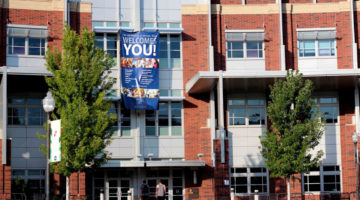
Henry MacDiarmid/Nevada Sagebrush
Interim Assistant Dean for the Office of Student Conduct Kimberly Thomas and Commander Eric James of police services speak in front of the Associated Students of the University of Nevada senate on Wednesday, Oct. 7 in the Rita Laden Senate Chambers. Their presentation was centered around the various education services Student Conduct provides.
Staff Report
On Wednesday, Oct. 7, Kimberly Thomas, the interim assistant dean at the Office of Student Conduct, gave a presentation to the Associated Students of the University of Nevada senate. The presentation, which she gave alongside Commander Eric James from the University of Nevada, Reno’s Police Services, detailed the various programs Student Conduct makes available to students who are cited for underage drinking.
The presentation came partly as a response to concerns over a steady rise in the number of Minor in Consumption/Possession citations, but James asserted that the increase is mostly the result of a rise in the student population.
“The percentages stay about the same,” James said. “A lot of it has come down to education with the dorm staff, identifying ‘that doesn’t look right, you know I’m going to call the police about that,’ or whatever it may be … they now know what to look for, so they’re calling us more.”
The number of liquor law violations rose from 125 in 2011 to 324 in 2013, according to the university’s Clery numbers. In the same period of time, the university’s population grew by about 800 students. In the first 12 days of October, campus police handed out 37 citations for various drinking-related offenses, though a majority of those came during and after the UNLV football game.
That being said, much of the programs provided by Student Services come into play only after someone’s been given an MICP citation.
Once someone’s cited by campus police, students are generally sent to court, according to Thomas. At that point, municipal court judges often send these students back to the Office of Student Conduct to receive disciplinary action. These students would then receive both official citations from the court and the university.
“That confuses a lot of students,” Thomas said. “They think, ‘oh wait a minute, I gotta go to court and now I gotta come to student conduct?’”
From there, the process is split into tiers. The first-tier programs, Brief Alcohol Screening Intervention for College Students or BASICS and the marijuana-centered counterpart CASICS, provide one-on-one counseling with alcohol educators. These programs are usually reserved for the most basic of liquor-related offenses.
However, should students blow higher than .18 into a Breathalyzer, they’re placed into Student High Risk Intervention for First Time alcohol violations. SHIFT specifically targets dangerous drinking behavior and was created in 2014 after judges noticed a trend of dangerously high blood-alcohol levels.
Upper-tier programs, like STEPSS or OnTRAC, require a more intense recovery regimen. Drug courts, screenings, breath tests and one-on-one meetings with drug counselors are all required at some point or another. These programs are used for more serious offenses that require more education, like a DUI.
“We pride ourselves on the fact that we are not a place of judgment,” Thomas said. “We’re not gonna tell you you’re a loser for life because you got an MIPC, that you’re a loser for life because you drank beer at a party and came back to your dorm throwing up, but we are going to hold you accountable for your behavior.”
Thomas added that one of the primary goals of Student Conduct is to help students refocus on why they really came to college and help them make better decisions.
“Our job in student conduct is not often seen as one to be a part of the educational process, but we are,” Thomas said. “You did not come to school to drink and party.”
The news desk can be reached at jsolis@sagebrush.unr.edu and on Twitter @TheSagebrush.











